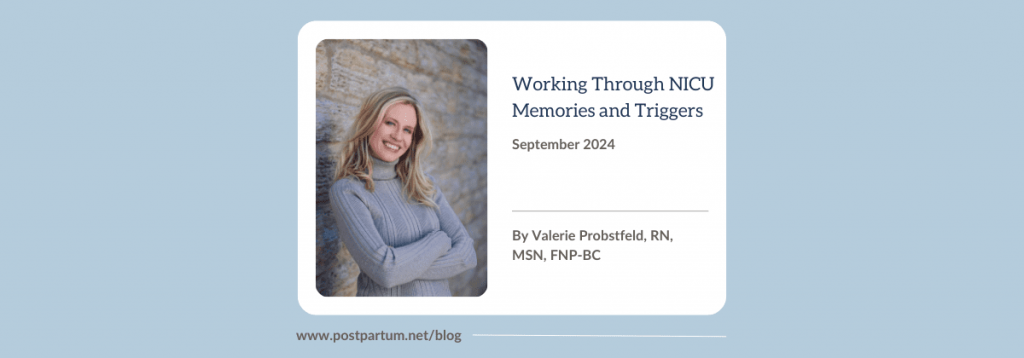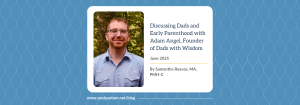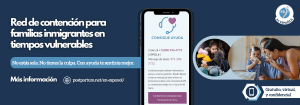By Valerie Probstfeld, RN, MSN, FNP-BC
Common Struggles of NICU Parents
I experienced a lot of worry when my baby was in the Neonatal Intensive Care Unit (NICU). In fact, “worry” comes from the West Germanic word “wyrgan,” which means to “strangle” or “seize by the throat and tear.”
Worry and anxiety originate from the body’s stress response, known as the sympathetic nervous system, commonly referred to as fight, flight, and freeze. The brain hyper-focuses on the perceived stressor for survival while the body prepares to fight back, run, or stand still to keep safe.
This is a subconscious reaction to real or imagined danger. There were times I wanted to run home with my baby and flee the hospital. There were other days I was brought to my knees and froze. There were also plenty of situations in which I fought back in full “Mama Bear” mode.
The whole experience felt like an alternate universe. I could see and hear the beeps and monitors in my dreams. I also felt fear and anger in my body during and after our time in the NICU. Years later, machine sounds and healthcare provider rounds could easily trigger traumatic NICU memories. My mind traveled back in time during those moments and subconsciously triggered the same fight, flight, and freeze response.
I am not alone. According to a recent study published in the Journal of Perinatology, approximately half of NICU parents face trauma, anxiety, or depression. 1 Dr. Bessel Van Der Kolk, an international expert on post-traumatic stress, emphasizes that the body instinctively looks for an escape plan when the brain’s fear center is triggered. Van Der Kolk points out that the fear alarm is unable to turn off when one feels trapped. 2 It is estimated that 40 percent of NICU parents experience some form of post-traumatic stress disorder (PTSD). 3
Seeking Help
It took many years to discover what could alleviate my triggers. This required the help of a few amazing counselors. I encourage you to reach out to a healthcare professional and mental health therapist if you struggle with similar feelings. There is treatment available. It is not a weakness to ask for help, but a strength.
Journaling
Other things that helped me during this time include journaling, music, my dog, and drawing. I wrote down my feelings and experiences during the hospitalization and afterward. It helped to get thoughts out of my head. Studies support this and show the act of journaling can be beneficial to help with anxiety associated with the NICU. 4
Music
Music was also beneficial. I wrote about how music can soothe hospitalized babies during graduate school. However, I realized that it also calmed me during the NICU. I often sang to my daughter and later learned that lullabies synchronize heart rates together. This provides a calming effect for both mom and baby. Researchers discovered when moms sang “Twinkle, Twinkle, Little Star” to their baby, it increased calmness not only in the infant but also in the mom. 5
Years later, I enjoy playing my flute at local hospitals as a way to give back. I want to alleviate some of the hospital stress and provide patients solace for a brief moment.
Drawing
Drawing pictures helped soothe my body as well. Studies reveal the potential benefit of art and the hospitalization experience. 6 This is sometimes referred to as “creative arts therapy” and is where science and art truly meet. 7 Creative arts are helpful for patients, families, and healthcare providers. I remember singing and dancing with my daughter once I brought her home from the NICU.
Pet Therapy
Another helpful resource is pet therapy. There were no pets in the NICU itself. However, coming home to my dog was helpful. There is much evidence that reveals the benefits of pet therapy on anxiety and stress. 8
Healing Through Helping
Working through my NICU memories and triggers has been challenging, however, I have learned a lot about myself and self-soothing along the way. Now I host a podcast for moms and I interview guests who discuss a variety of resources for parents during the early parenting years and beyond. You can find my podcast on Apple, Spotify, and Google: “To Mom is To Love with Valerie Probstfeld, NP.” Learn more on my website: https://www.tomomistolove.com/
If you have any questions or concerns regarding your health, please contact your healthcare provider.
Resources:
References:
1. Grunberg, V.A., Geller, P.A., Hoffman, C., Njoroge, W., Ahmed, A., Patterson, C.A. (2021). Parental mental health screening in the NICU: A psychosocial team initiative. Journal of Perinatology, 42(3), 401-409. doi: 10.1038/s41372-021-01217-0
2. Van Der Kolk, Bessel. 2015. The Body Keeps the Score: Brain, Mind, and Body in the Healing of Trauma. New York: Penguin Books.
3. March of Dimes. (2023, July 6). Coping with postpartum anxiety and PTSD in the NICU. https://www.marchofdimes.org/find-support/blog/coping-postpartum-anxiety-and-ptsd-nicu
4. Russell, L.N., Gregory, M.L., Warren, Z.E., Weitlauf, A.S. (2021). Update and impact of journaling program on wellbeing of NICU parents. Journal of Perinatology. 41(8), 2057-2062. doi: 10.1038/s41372-021-00983-1
5. Vedantam, S. (2019, September 30). Baby talk: Decoding the secret language of babies {Radio broadcast]. NPR. https://www.npr.org/transcripts/765855335?ft=nprml&f=610989057
6. Nielsen, S.L, Fich, L, B., Roessler, K.K., Mullins, M.F. (2017). How do patients actually experience and use art in hospitals? The significance of interaction: A user-oriented experimental case study. International Journal of Qualitative Studies in Health and Well-being. 12(1): 1267343. doi: 10.1080/17482631.2016.1267343
7. Mayo Clinic Press. (2023, October 16). The intersection of art and healing: How art can help promote well-being. https://mcpress.mayoclinic.org/living-well/the-intersection-of-art-and-health-how-art-can-help-promote-well-being/
8. NIH News in Health. (2018, February). The power of pets: Health benefits of human-animal interactions. https://newsinhealth.nih.gov/2018/02/power-pets










